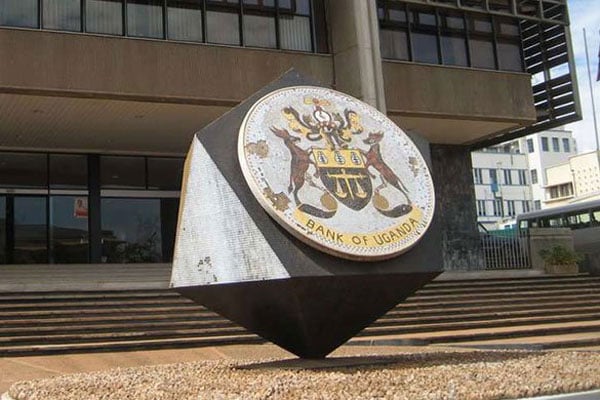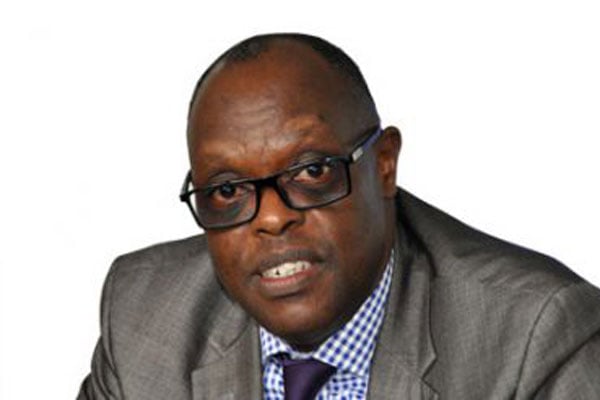
Bank of Uganda headquarters in Kampala, Uganda. PHOTO/FILE
|National
Prime
Who will be the next BoU governor?
What you need to know:
- This publication understands that discussions on who will be the 11th Governor are already happening behind the scenes with names lined up for vetting in contention for the top job.
When the Bank of Uganda Governor, Prof Emmanuel Tumusiime-Mutebile, died on January 23, the position he occupied for two decades also fell vacant.
The governor is the chief executive officer and the chairman of the board of directors of the Bank of Uganda.
Under the Bank of Uganda (BOU) Act, the governor is appointed by the President in consultation with Cabinet.
This publication understands that discussions on who will be the 11th Governor are already happening behind the scenes with names lined up for vetting in contention for the top job.
A Governor earns more than Shs54m per month.
Part IV of the Bank of Uganda Act 2000 states: “There shall be a governor who shall be a person of recognised financial or banking experience and shall be appointed by the President on the advice of the Cabinet.”
According to research analyst Paul Corti Lakuma, whoever will eventually take up the job should bear in mind that while price stability and external balance is the core work of the Central Bank, there is need to balance that mandate with the political ambitions of the executives of developing the country.
Ms Peninnah Mbabazi, a financial sector analyst, says the next Central Bank governor should focus on managing the economy with the right financing strategies needed to resuscitate the economy. She adds that they should have the country’s debt trajectories managed, while addressing proper utilisation, transparency and accountability of resources.
With behind the scene efforts to have the new Governor in high gear, below are some of the leading contenders we think qualify for the top job.
Some of the leading contenders for Bank of Uganda governor job
BoU Deputy Governor Micheal Atingi-Ego: There is no doubt that the current Deputy Governor, BoU, Dr Micheal Atingi-Ego, can ably fill the vacant position. He was appointed at the position three months after Dr Louis Kasekende served out his two-term of five years contract as the number two to the fallen Governor.

Deputy BoU Governor Micheal Atingi-Ego.
He is a seasoned economic policy technocrat who has served in several capacities at various institutions. He started his career at BoU rising through the ranks. His international exposure and deep knowledge on regional macroeconomic and financial issues provide him with the necessary professional and technical expertise needed for such an institution.
Adam Mugume, BoU executive director for Research
Dr Mugume is a highly respected economist with many years of experience in central banking and academia. Since 2011, he has been head of the BoU’s Research and Policy Directorate, where he is responsible for overseeing the Central Bank economic forecasts and monetary policy formulation.

Adam Mugume, BoU executive director for Research.
He has been instrumental in the successful implementation of the Inflation Targeting monetary policy framework, which has enabled the bank to maintain firm control over inflation. He is one of the few amiable technocrats always willing to engage freely on issues relating to economy and Central Bank functions.
Prof Juma Waswa Balunywa: This name has been in the mix for a while now for this position. And perhaps rightly, considering that his qualification renders him as a leading contender. He is a scholar in management, leadership and entrepreneurship.

Prof Juma Waswa Balunywa.
The Principal of Makerere University Business School (Mubs) has been at the helm of the institution since 1991, when Mubs was the Faculty of Commerce of Makerere University. Given his longevity at the institution, means he has endured several battles there. Both friends and foes seems to concur that that he transformed the face of business education at the tertiary level for the better.
Louis A. Kasekende (PhD): The former Central Bank Deputy Governor was in the frame for the top BoU job . Dr Kasekende, an economist and a professional banker, left BoU after his contact expired. He is the executive director of the Macroeconomics and Financial Management, Institute of Eastern and Southern Africa (MEFMI) based in Harare, Zimbabwe, since April1 2021.

Louis A. Kasekende (PhD)
Before that, he served as the Deputy Governor of the Bank of Uganda. He began his five-year term in this position on January 18, 2010. This marked the second time that he was appointed to this office, having served in the same capacity from 1999 until 2002.
Mr Stephen Kaboyo: He is one of the leading commentators on the financial markets and related matters. Mr Kaboyo is currently the managing director of Alpha Capital Partners, an indigenous Ugandan firm focusing on sovereign asset management, foreign exchange trading strategies and financial markets advisory.

Mr Stephen Kaboyo.
Before joining Alpha Capital Partners, Mr. Kaboyo was the Director Financial Markets at BoU. He commands a wealth of experience spanning more than 20 years in Financial Markets. He is also a pioneer of the Capital Markets industry in Uganda having been responsible for setting up the initial regulatory structures that eventually gave creation to the Capital Markets Authority.
Dr Ezra Suruma (PhD): He is a former Minister of Finance known for his no nonsense approach to work. He is a solid economist, banker, and academic. He joined Bank of Uganda in 1987 as the director of research, serving in that capacity until 1990.

Dr Ezra Suruma (PhD).
From 1990 until 1993, he served as the deputy governor of the Central Bank. In 1993, he left that position and joined the Uganda Commercial Bank as the chairman and managing director, serving in that capacity until 1996. In 2005, he was appointed minister of Finance until February 16, 2009, when he was appointed senior presidential adviser on finance and economic planning.
Dr Lawrence Muganga: The Ugandan-born Canadian economist, researcher, academic administrator and an award winning author of several books that have been ranked by Amazon as best sellers around the world. The Vice Chancellor of Victoria University is a competent administrator with firm grasped of economics.

Dr Lawrence Muganga.
He studied at Makerere University, where he obtained both a Bachelors and Master’s Degree in Economics, then University of Alberta in Canada where he successfully attained both a Master’s in Education and PHD in Educational Administration and Leadership. At Harvard University, he pursued Post- Doctoral studies focusing on Higher Education Teaching.
Mr Keith Muhakanizi: Mr Keith Muhakanizi is the accounting officer for the Office of the Prime Minister. The former Permanent Secretary and Secretary to the Treasury, Ministry of Finance has been responsible for keeping the country’s economy on a steady upward path before the advent of Covid-19 pandemic.

Mr Keith Muhakanizi.
He is experienced given that he has served in different positions at the ministry for almost four decades. He was a deputy to the late Secretary to Treasury Chris Kassami who died in 2016. He succeed Kassami and ran the Treasury docket until July 2021 when Mr Museveni transferred him to OPM. Together with the late Governor Mutebile, the duo directed the country’s macroeconomics policy private sector growth in the country.
Ms Maria Kiwanuka: Ms Kiwanuka is one of the very able economist, businesswoman and a former Minister of Finance from May 27, 2011 to March 1, 2015. Beginning around 1980, she worked for more than 10 years with the World Bank as an economist and financial analyst for the East Asian and Southern African regions. On March 1, 2015, she was dropped from Cabinet and appointed senior financial adviser to President Museveni.

Ms Maria Kiwanuka.
Mr Michael Tusiime: He is an economist, tax consultant, administrator and politician. He is the founding chairperson of Interventions For Rural Transformation, the founding CEO of Tusiime Foundation, a board member of Iron Bridge Finance and a resident research fellow at Agency for Transformation.

Mr Michael Tusiime.
He also worked in supervisory role with Uganda Revenue Authority from 1997 to 2010, he formerly served as a liaison officer to President of the Republic of Sierra Leone and as a research adviser to IMF’s resident tax adviser in Uganda.
Dr Joseph Muvawala: Dr Muvawala holds a PhD in Economics, a Master of Arts in Economic Policy and Planning and a Bachelor of Arts in Economics and Social Administration, all from Makerere University.

Dr Joseph Muvawala.
He possesses professional experience both at middle-level and top management of more than 20 years in development practice and policy formulation. He is currently the executive director of National Planning Authority. His name has also featured among top economists lined up for the Governor job.
Mr Tumubweine Twinemanzi: Mr Twinemanzi is currently the executive director of the Bank Supervision Directorate of the Bank of Uganda.

Mr Tumubweine Twinemanzi.
Prior to his appointment to his current position, he served as the director of Industry Affairs and Content (Economic Affairs) at the Uganda Communications Commission.
Previous governors and time in office
1. Joseph Mary Mubiru (1966–1971)
2. Moses Ssemyano Kiingi (1971–1973)
3. Onegi Obel (1973–1978)
4. Henry Kajura (1978–1979)
5. Charles Nyonyintono Kikonyogo (1979)
6. Gideon Nkojo (1979–1980)
7. Leo Kibirango (1981–1986)
8. Suleiman Kiggundu (1986–1990)
9. Charles N Kikonyogo (1990–2000)
10. Emmanuel Tumusiime-Mutebile (2001–2022)
11. Who is next?

Bank of Uganda headquarters in Kampala, Uganda. PHOTO/FILE
BoU Act
PART IV—OFFICERS AND STAFF.
27. The governor and deputy governor.
(1) There shall be a governor who shall be a person of recognised financial or banking experience and shall be appointed by the President on the advice of the Cabinet.
(2) There shall be a deputy governor who shall be a person of recognised financial or banking experience and shall be appointed by the President acting on the advice of the Cabinet.
(3) The governor and deputy governor shall be appointed for a period of five years and shall be eligible for reappointment.
(4) The governor and deputy governor shall not while holding the office of governor or deputy governor occupy any other office or employment whether remunerated or not.
(5) Notwithstanding subsection (4), the governor or deputy governor may—
(a) become a trustee of any staff, pension, provident or superannuation fund or scheme;
(b) with the approval of the Minister act as a member of any commission or committee appointed by the Government to inquire into any matter affecting currency or banking or other matters;
(c) with the consent of the Minister and the approval of the board, become a director, governor or member of the board, by whatever name called, of any international bank or an international monetary authority to which the Government shall have adhered or given support or approval.
(6) The governor and deputy governor shall be appointed on conditions specified in their letters of appointment.
(7) The governor or deputy governor may resign his or her office by writing addressed to the Minister, and the resignation shall take effect one month from the date of receipt of the letter of resignation by the Minister.
Qualifications: The governor and deputy governor shall be appointed for a period of five years and shall be eligible for reappointment. The act further stipulates that the governor and deputy governor shall not, while in office, take up any other office or employment, whether paid or unpaid. It is a requirement, that both the governor and deputy governor, shall be individuals with recognised financial or banking experience.





